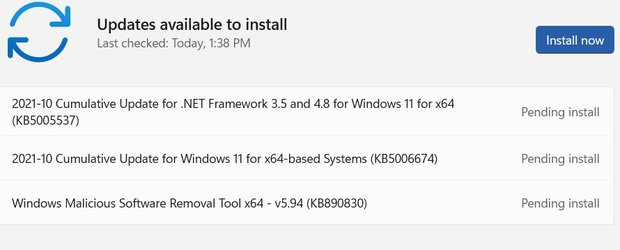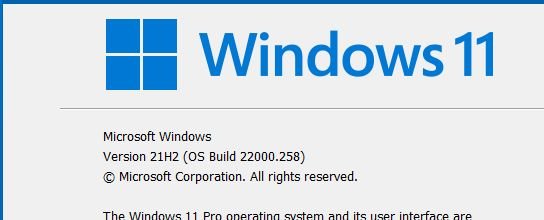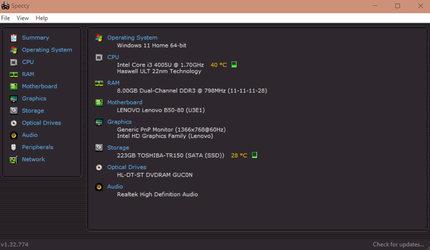I'm having some surprising results upgrading unsupported hardware to Windows 11. Some machines I would expect success on, but I have a lot of "unsupported" systems as well where I would have expected at least a small amount of resistance. Here is breakdown of the unsupported systems:
1 Machine that will never run Win 11 as it is BIOS based, and has no TPM (very old machine. At least 10 years old.)
1 Machine is a 7th Gen mobile i7 making it unsupported, but it does meet all other requirements (TPM, Secure Boot, etc.)
1 Machine is a 6th Gen mobile i7. Like the i7, the CPU is the only technically unsupported item.
1 machine is a 4th Gen desktop i7. Is has a TPM module but it is a 1.2 version, not 2.0.
1 machine is a 3rd Gen i5 (!). Does have a TPM 2.0 module.
I was able to successfully install Windows 11 on each and every one of these systems except the first one (the BIOS based system), without making ANY changes whatsoever. Just took a 100% unmodified Windows image on a thumb drive and do a clean install from it. I was a bit surprised at how easy this was.
My point here is that if you have some old hardware, don't be discouraged. At least give it a try and you may be surprised at the results. A couple of notes:
1) I would suggest making a backup of your current installation so that you can revert back easily.
2) Note that you will need at least a version 1.2 TPM. At least I had that going for me. I equip every machine I've built in the last decade with a TPM.
3) Expect this to work only with a clean install, NOT an upgrade.
1 Machine that will never run Win 11 as it is BIOS based, and has no TPM (very old machine. At least 10 years old.)
1 Machine is a 7th Gen mobile i7 making it unsupported, but it does meet all other requirements (TPM, Secure Boot, etc.)
1 Machine is a 6th Gen mobile i7. Like the i7, the CPU is the only technically unsupported item.
1 machine is a 4th Gen desktop i7. Is has a TPM module but it is a 1.2 version, not 2.0.
1 machine is a 3rd Gen i5 (!). Does have a TPM 2.0 module.
I was able to successfully install Windows 11 on each and every one of these systems except the first one (the BIOS based system), without making ANY changes whatsoever. Just took a 100% unmodified Windows image on a thumb drive and do a clean install from it. I was a bit surprised at how easy this was.
My point here is that if you have some old hardware, don't be discouraged. At least give it a try and you may be surprised at the results. A couple of notes:
1) I would suggest making a backup of your current installation so that you can revert back easily.
2) Note that you will need at least a version 1.2 TPM. At least I had that going for me. I equip every machine I've built in the last decade with a TPM.
3) Expect this to work only with a clean install, NOT an upgrade.
My Computers
System One System Two
-
- OS
- Win11 Pro 24H2
- Computer type
- PC/Desktop
- Manufacturer/Model
- Self-built
- CPU
- Intel i7 11700K
- Motherboard
- ASUS Prime Z590-A MB
- Memory
- 64GB (Waiting for warranty replacement of another 64GB for 128GB total)
- Graphics Card(s)
- No GPU - Built-in Intel Graphics
- Sound Card
- Integrated
- Monitor(s) Displays
- HP Envy 32
- Screen Resolution
- 2560 x 1440
- Hard Drives
- 1 x 1TB NVMe SSD
1 x 2TB NVMe SSD
1 x 4TB NVMe SSD
3 x 512GB 2.5" SSD
1 x 4TB 2.5" SSD
5 x 8TB Seagate Barracuda HDD
- PSU
- Corsair HX850i
- Case
- Corsair iCUE RGB 5000X mid tower case
- Cooling
- Noctua NF-S12A chromax.black.swap case fans (Qty. 7) & Home Computer Specifications, Configuration, and Usage Notes General Specifications ASUS Prime Z590-A motherboard, serial number M1M0KC222467ARP Intel Core i7-11700K CPU (11th Gen Rocket Lake / LGA 1200 Socket) 128GB Crucial Ballistix RGB DDR4 3200 MHz DRAM (4 x 32GB) Corsair iCUE RGB 5000X mid tower case Noctua NH-D15 chromax.black CPU cooler Noctua NF-S12A chromax.black.swap case fans (Qty. 7) & Corsair LL-120 RGB Fans (Qty. 3)
- Keyboard
- Corsair K70 Max RGB Magnetic Keyboard
- Mouse
- Logitech MX Master 3
- Internet Speed
- 1Gb Up / 1 Gb Down
- Browser
- Edge
- Antivirus
- Windows Defender
- Other Info
- The five 8TB drives and three 512GB SSDs are part of a DrivePool using StableBit DrivePool software. The three SSDs are devoted purely to caching for the 8TB drives. All of the important data is stored in triplicate so that I can withstand simultaneous failure of 2 disks.
Networking: 2.5Gbps Ethernet and WiFi 6e
-
- Operating System
- Win11 Pro 23H2
- Computer type
- Laptop
- Manufacturer/Model
- Lenovo ThinkBook 13x Gen 2
- CPU
- Intel i7-1255U
- Memory
- 16 GB
- Graphics card(s)
- Intel Iris Xe Graphics
- Sound Card
- Realtek® ALC3306-CG codec
- Monitor(s) Displays
- 13.3-inch IPS Display
- Screen Resolution
- WQXGA (2560 x 1600)
- Hard Drives
- 2 TB 4 x 4 NVMe SSD
- PSU
- USB-C / Thunderbolt 4 Power / Charging
- Keyboard
- Backlit, spill resistant keyboard
- Mouse
- Buttonless Glass Precision Touchpad
- Internet Speed
- 1Gb Up / 1Gb Down
- Browser
- Edge
- Antivirus
- Windows Defender
- Other Info
- WiFi 6e / Bluetooth 5.1 / Facial Recognition / Fingerprint Sensor / ToF (Time of Flight) Human Presence Sensor








